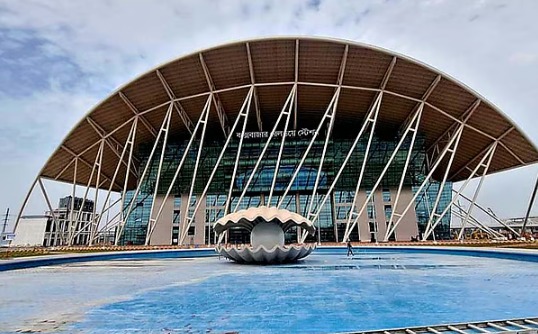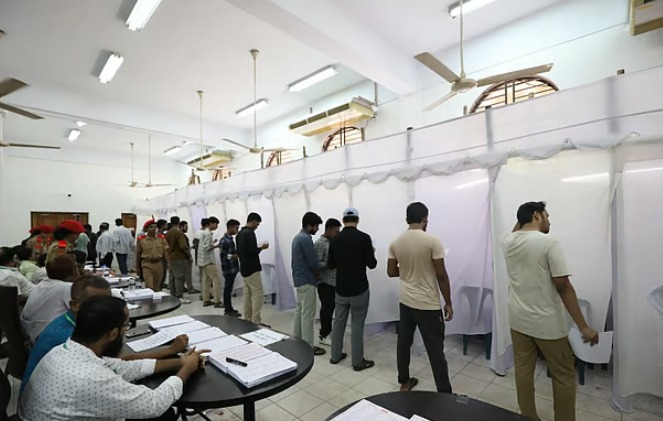Desk Report,
Cox’s Bazar train has not been transporting goods for a year and a half
The railway line from Dhaka and Chittagong to the country’s main tourist city, Cox’s Bazar, was launched a year and a half ago. It was said in favor of the project that if this railway line is launched, in addition to passenger transport, fishery, forest and agricultural products of the coastal Cox’s Bazar district can be supplied to the whole country at a low cost. This will earn the railways Tk 50 crore annually.
Cox’s Bazar train has not been transporting goods for a year and a half
Train operations on this new railway line began on December 1, 2023. Currently, two to four passenger trains each travel to and from Cox’s Bazar with Dhaka and Chittagong. That is, freight trains have not been launched. Even passenger trains have not been equipped with any luggage vans carrying goods; due to which the benefits of this railway line built at a huge cost are not being realized.
Businessmen said that they have been demanding the launch of freight trains from Cox’s Bazar since the beginning. This will reduce the pressure of goods-carrying vehicles on the Chittagong-Cox’s Bazar highway. Currently, an average of about five thousand vehicles ply on this narrow highway every day. This often leads to accidents. If a large part of the goods are transported by train, the traffic pressure on the road can be reduced and the accident rate can be reduced. Meanwhile, the engineering and commercial departments of the railway have two opinions on connecting goods trains or coaches. Officials of the railway’s commercial department say that they have not yet received any demand from any local or Chittagong businessmen to transport goods by train on this route. However, there are not enough engines to run goods trains. According to the railway’s engineering department, the lack of demand is not correct. If initiatives are taken, a response will definitely be received.
Mohammad Mahbubur Rahman, the chief commercial officer of the eastern region of the railway, told Prothom Alo that there is currently no plan for transporting goods in Cox’s Bazar. Because there is currently a shortage of engines; due to which it is struggling to run regular goods trains. And no demand or interest has ever been received from anyone in Cox’s Bazar. However, discussions will be held with local businessmen and stakeholders on this matter. If they make a demand, the matter will be considered.
Railway General Manager and Project Director Mohammad Sabuktagin also told Prothom Alo that there is no demand for goods transport from Cox’s Bazar, this is not the case. There is a plan to add two luggage vans to the intercity train on the Chittagong-Cox’s Bazar route. This will be discussed with the commercial department. The issue will also be raised in the regular monthly meeting of the Railway. He mentioned that a response can be received if the Railway takes initiatives.
Huge difference between intention and reality
About 11,000 crore taka has been spent on the construction of this 102-kilometer railway line from Dohazari in Chittagong to Cox’s Bazar. The project proposal stated that the Railway would earn 442 crore taka annually through passenger and goods transport on the Chittagong-Cox’s Bazar route. The Railway would get at least 50 percent of the tourists who come to Cox’s Bazar from all over the country. In the first year, it will be possible to earn 392 crore taka in passenger transport and 500 crore taka in goods transport. But there is a two-level difference between the statement and the reality. In the first one year, only 800 million taka was earned by running passenger trains, which is one-fifth of the target.
Risks on the road in salt transportation
Cox’s Bazar has high commercial importance due to its mountains, sea and border (with Myanmar). Especially because of the sea, the fishing and salt industries have developed here. The majority of the total salt demand in the country comes from the Cox’s Bazar region. According to the Bangladesh Small and Cottage Industries Corporation (BSCIC), the annual demand for salt in the country this year is 2.61 million metric tons. Of this, 2.25 million metric tons were produced in the Cox’s Bazar region.
Salt is taken from Cox’s Bazar by truck across the country. Due to this, the Chittagong-Cox’s Bazar highway has become risky. Because water from salt transporters makes the road slippery. As a result, accidents occur. For example, during this year’s Eid-ul-Fitr holiday, 16 people died and 20 were injured in three road accidents in Jangalia, Lohagara on the Chittagong-Cox’s Bazar highway in 48 hours. At that time, police and road department officials said that these accidents occurred due to risky bends and salt water. Therefore, if the salt produced in Cox’s Bazar is supplied by train, the risk of accidents will be reduced to a large extent.
Potential for transportation of fish and agricultural products
According to the information of the Cox’s Bazar District Fisheries Officer’s Office, the annual fish production in this district is 249,000 metric tons. Of this, Hilsa is about 36,000 metric tons. The annual demand for fish in this district is about 60,000 metric tons. The remaining 180,000 metric tons of fish are sent to different parts of the country including Chittagong and Dhaka. In addition, dried fish worth several hundred crores of taka are produced annually. A large part of this goes to different parts of the country like fish.
Traders said that Cox’s Bazar betel nuts are in high demand across the country due to their large size. Betel nuts from here are also exported to different countries. During the season, an average of 225 trucks of betel nuts are supplied to different parts of the country every week. According to the District Agricultural Extension Department, there are betel nut orchards on 8,645 acres of land in various areas of the district including Ukhia, Teknaf, Ramu, Cox’s Bazar Sadar, Eidgaon, Chakaria, Pekua upazilas. Betel nut is produced in an amount of 12,967 metric tons. If the price of dried betel nut is Tk 300 per kg, betel nut is produced in an amount of Tk 390 crore per year. During winter, vegetables produced in Cox’s Bazar are sent to different parts of the country including Chittagong-Dhaka by various vehicles including trucks. If arrangements are made for vegetable transportation by train, the farmers here will benefit.
Abu Morshed Chowdhury, President of Cox’s Bazar Chamber of Commerce and Industries, told Prothom Alo that they have been interested in Cox’s Bazar since the beginning.



